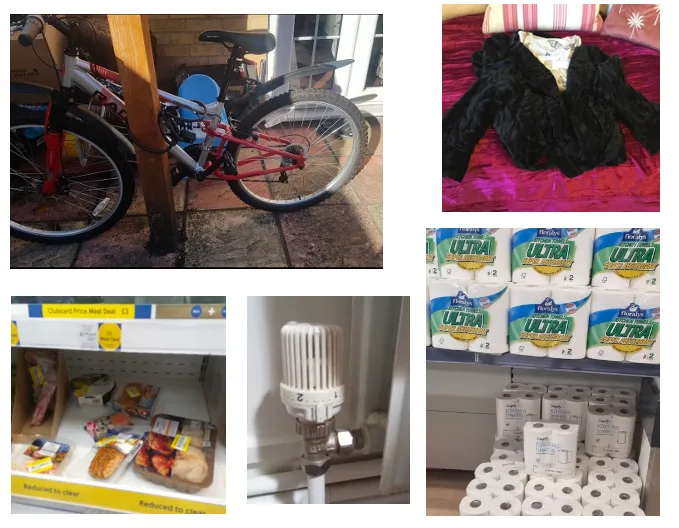“after the [Covid-19] pandemic it’s like people have gone from one crisis into another… we have gone from hoarding food in fear of not being able to get it, to doing the opposite”.
22 May 2023
Who is responsible for tackling the cost-of-living crisis?
Tianne Haggar, Suzanne Hall, Rachel Hesketh, Kirstie Hewlett, Hannah Piggott & Zara Regan
The Policy Institute is working with peer researchers to understand the impact of the cost-of-living crisis in three London boroughs

In October 2022, we set out to explore the impact of the cost-of-living crisis through the eyes of a small group of residents living in Lambeth, Southwark and Westminster. These "peer researchers" took an active role in shaping and analysing our research, capturing their everyday experiences of coping with sharply rising costs. By working closely with community members, we aimed to promote an inclusive approach to policy design by prioritising what matters, and what works best, for those most affected.
Peer researchers completed an online diary over two weeks, documenting their experiences of the increasing cost of living. They shared with us how they budgeted for their weekly food shop, made changes to save money in the home, and whether they had accessed any kind of support. They also conducted a short interview with someone they knew well to understand how increasing costs were impacting those around them.
Even before the winter set in, our peer researchers revealed that they were extremely worried about increasing costs, with some disclosing that they had struggled to pay their bills. One female participant who relied on a state pension as her only source of income told us, “I am worried about the situation worsening over the winter… I don’t have a fall-back solution”. Our peer researchers were not just worried for themselves though – their concern stretched to others, especially children and older relatives. One person told us, “I worry about my auntie who is in her 80s, and the effect that rising gas and electric bills will have on her health and her ability to keep warm”, whilst a mother said, “I have to make sure I have [the children’s] packed lunch for the week so they are able to thrive at school”.
Daily life was characterised by mounting pressures and increased uncertainty, contributing to concern for people’s wellbeing. One peer researcher told us that:
Peer researchers were also devoting more time and energy than ever to managing their finances. One, who worked as a teacher, told us how cost needed to be factored into every decision, expressing:
“I can feel it under my skin… in every single thing”.

Meanwhile, a pensioner reflected on her interviewee, who “is a strong woman… [but] this is wearing her down”. We also heard that parents felt pressure to afford a good life for their children, struggling to juggle emotional and financial responsibilities. One peer researcher told us how her interviewee had decided to return to work instead being a full-time mother, because of the guilt she felt at her husband taking on all financial responsibility.
In the face of adversity, our peer researchers demonstrated great resilience in adapting to cope with financial pressures. In the home, people changed their patterns of energy consumption to limit use. A single mother told us that she puts “an extra blanket on top of [her] duvet to avoid putting the heating on”, whilst another woman said that she now uses “a 20-degree wash or a quick 15-minute wash” for clothes. In the supermarket, people shopped around for deals, used loyalty schemes, bulk bought in cheaper shops, and organised their meals around offers and reduced items. People tried to save every penny, as one remarked, “another handy bulk buy which saved me 97p!”. Other changes people made included using their car less, using a bike to get around, and buying clippers to trim their hair or beard at home instead of visiting the barbers.

Whilst our peer researchers adapted to cope with increasing costs, few had accessed additional support services such as food banks or going to the Citizens Advice Bureau. Awareness of available support was relatively low; as one participant told us, “I’ve been speaking to a few people since doing this research, and most people are like me and do not know what is available”. Our peer researchers told us that they wanted more useful information in local communities to direct people to support services. Another key barrier was stigma. Several peer researchers told us that they had always worked and had never considered themselves as eligible or in need. One mother told us, “I have found myself asking people for favours, which isn’t like me”, whilst another explained that it would be “really embarrassing and shameful to access a food bank as I have always worked”.
There was a strong desire for the government to step up and do more to support “the most vulnerable”. The energy bills support scheme was seen as a vital lifeline, but support from authorities needed to go further. Catching up with one of our peer researchers more recently, he told us that the energy bills support merely offset some of his rising bills, and that he was still worse off in real terms. He stressed that people need to feel looked after by the government. For him, this meant seeing a real positive impact to people’s lives through government action, explaining that “people need to feel something has happened, not just empty words… even just a small change to ignite the rest of it”.
Despite the daily pinch of increasing costs, our peer researchers have shown us that individuals are demonstrating great responsibility and resilience to cope with the increasing cost of living. However, it calls into question the roles and responsibility that larger actors, including national government, local authorities, and industry, have to play. People cannot simply budget their way out of poverty – significant structural changes are needed to bring about the changes that people need and want to see.



